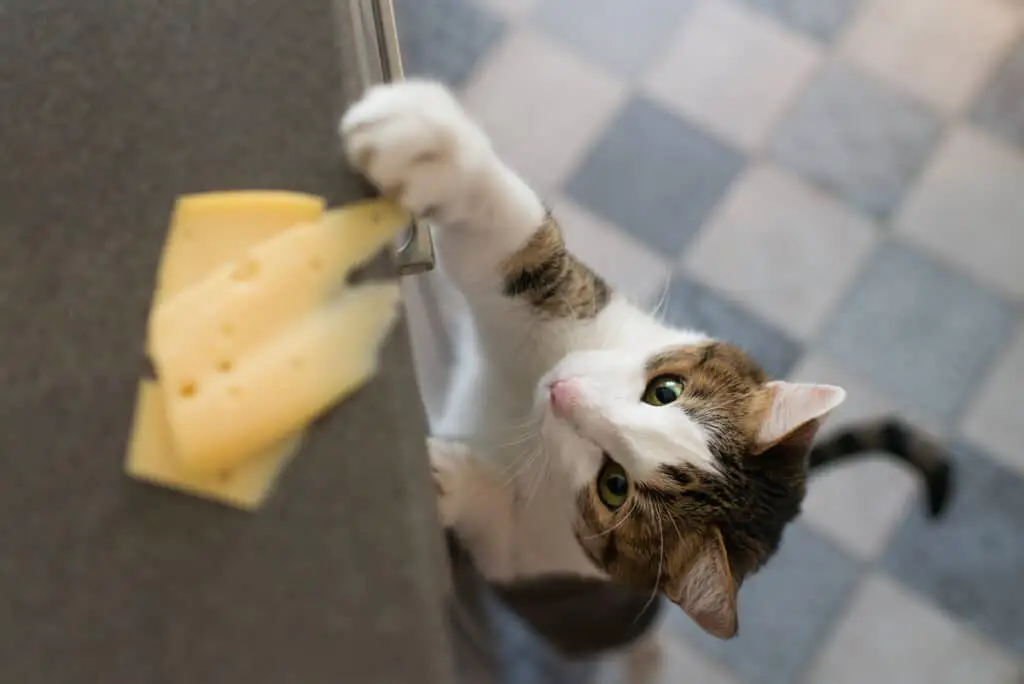Although most people assume cheese is ok for cats to eat, the truth is that cats should not eat cheese. Cats do not contain the enzyme to break down the lactose in cheese, so they are lactose intolerant. Large amounts of cheese can cause vomiting and diarrhea. Small amounts of cheese over time can cause digestive discomfort and lead to weight gain in cats.
Is Cheese Bad For Cats?
Because we’ve been inundated with images of cats lapping up milk, we assume they can eat all dairy products, including cheese. However, the truth is that cheese is bad for cats.
Cats cannot produce the enzyme to break down the lactose in cheese, meaning they are lactose intolerant! Eating just small amounts of cheese can cause gastrointestinal discomfort, like gas and bloating. Large amounts of cheese can cause more serious problems like vomiting and diarrhea.
Also, cheese is high in fat and salt, which are not healthy in high amounts for cats. Cats are carnivores, meaning they should get most of their calories from protein. As such, too many fats or carbohydrates can lead to obesity in cats. Obese cats are at a higher risk of diabetes and a shorter life in general, so helping your cat lose weight can be key to their health.
Can Cats Eat Small Amounts of Cheese?
Cats really shouldn’t eat any amount of cheese large or small. However, small amounts of cheese are probably not fatal to a cat. You’ll probably notice discomfort from your cat, but that will pass with time.
Symptoms of Cheese Ingestion in Cats
While the best way to tell if your cat has eaten cheese is to visually see them do it, there are a few symptoms that can help you determine if your cat has consumed cheese:
- Vomiting
- Diarrhea
- Excessive trips to the litter box
- Pooping outside the litter box
- Passing gas
- Fatigue and lethargy
Foods That Contain Cheese
There are a lot of foods that contain cheese that you need to look out for. Some of these are:
- Cheese Grits.
- Cheese Fondue.
- Cheese Snacks and Appetizers.
- Lasagna.
- Potatoes au gratin.
- Cheesecake.
- Cheese Pizza.
- Grilled Cheese Sandwich.
- Certain Snacks with Powdered Cheese like Cheez-Its.
Do Cats Like Cheese?
Cats absolutely love cheese (and other dairy products for that matter), so keeping it away from them can be difficult. If you leave out cheese of any kind, your cat will most likely try to eat it. Therefore, the best way to keep your cat from eating cheese is to make sure it’s stored in the fridge or out of reach if you’re not using it. Don’t leave cheese unattended. Cats can smell cheese from the other room, so they’ll hone in on it quickly if you leave it out.
Are Other Dairy Products Bad For Cats?
Like cheese, most dairy products are bad for cats because they contain lactose and high amounts of fat. Even milk should not be given to cats (although they’ll definitely beg for it). Here is a list of other dairy products that are bad for cats:
- milk.
- butter.
- cheese.
- yogurt.
- cream (heavy cream, sour cream, etc)
- ice cream.
- whey.
- casein.














